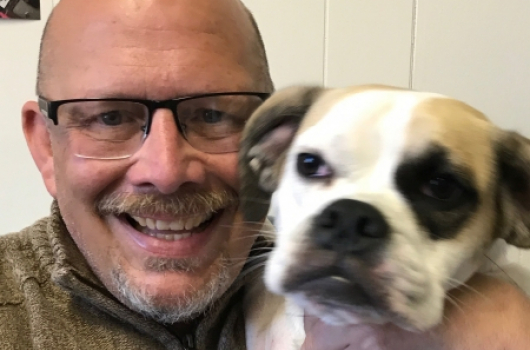There’s Always More: Surviving Suicide, Embracing the New
*Content Warning: Mention of suicide attempt*

In the summer of 2014, my 24-year marriage came to an unexpected end. The months that followed dragged me int
o a deep depression. The darkness overwhelmed me so that I was unable to do the work of a pastor. It was work that I’d been doing for a quarter-century and which I found very rewarding. In my depression, I lost my voice for preaching, my pen for writing, and my will to lead. A nearly 10-year ministry came to an end in a congregation I enjoyed serving and hoped to retire from.
On Friday morning, December 12, 2014, battling a deep sense of both personal and professional loss, I felt as if my life was done and my story over. As I looked in the mirror at the stranger I had become, I swallowed every pill in the medicine cabinet. Then I went and laid down to die.
BUT THANK GOD, I DIDN’T. I was given a second chance, and I am abundantly grateful. In the days that followed, I learned that my story was far from over. I still had a life to live, joy to discover, and work to do. With the help of medication, talk-therapy, and a circle of unbelievable support (a support that had always been present, but that I’d been blind to in the darkness of my depression), I reclaimed my life.
It was not an immediate 180-degree turn around. But every day was another step forward. Because I’ve gotten a second chance, I’ve had three more years with my beautiful children. Together we crossed something from our bucket lists when we jumped out of a plane at 13,500 feet. I ran with my daughter in her first half-marathon. We climbed Old Rag Mountain in Shenandoah National Park. Now, I get to celebrate that my daughter is studying abroad in Namibia, Africa, and working for women’s rights through her student internship. I watched my son become a personal trainer, and we’ve talked endlessly about our favorite sports teams.
I’ve been back in congregational ministry for two and a half years. I’m more engaged in ministry now than I’ve ever been. I’ve regained my voice for preaching, my pen for writing, and my will to lead. I’m more hopeful, compassionate, and understanding in my pastoral care. I’ve served more meals for the homeless, advocated for a more just and fair society, dedicated infants, baptized youth, married couples, and buried some remarkable saints. I’m a pastor again.
Since that December morning three years ago, I’ve made new friends, been to new places, and had many opportunities to laugh and experience life’s goodness. I’m fully alive in my relationships and work.
No matter how overwhelming the darkness may seem in the moment, there’s always more: more relationships to be formed, good works to do, new experiences to be had, and laughter to be shared. Depression will not consume us if we remember that it’s not the only reality. There’s more to our stories.
Peace!
Dr. Mark E. Poindexter has been a Disciples pastor since 1989. In addition to his nearly three decades of congregational ministry, he has served both the regional and general church in numerous ways, including a camp counselor/director for 20 years, co-chair of the Indiana Regional Discernment Task Force, Regional Moderator, and a member of the General Board. He was published in Guild Press’ Best Sermons in Indiana and has written numerous articles about the intersection of faith and culture for the religious blog, [D]mergent. Mark served in the United States Marine Corps from 1980-86. He has also run 13 full or half-marathons, completed five triathlons, and rode his bike covering the state of Indiana four times. In addition, Mark has battled severe depression and is a suicide survivor.
Print-friendly version here >>
If you are in crisis, please call the National Suicide Prevention Lifeline at 1-800-273-TALK (8255) or contact the Crisis Text Line by texting TALK to 741-741.
With hopes to support the prioritization of mental health and wellness in the life of the church, the NBA Mental Health Initiative aims to establish the necessary awareness and understanding required to counter stigma and change the landscape of conversation regarding mental illness and disorders within the church. Learn more at www.nbacares.org/mental-health.